Judy Heumann is no stranger to the disability community. A rockstar in her own right, the disability advocate has led some of the nation’s biggest conversations and movements for disability rights.
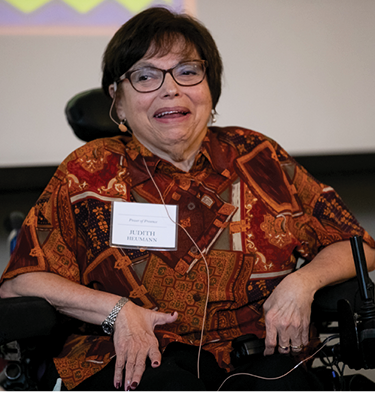 During a four-day visit to Georgia, Heumann shared her experiences and story as a disabilities and civil rights activist that spans more than 50 years. She was the keynote and lecturer at the Georgia Disability History Symposium and gave a guest lecture at the University of Georgia (UGA); and headlined an event in Decatur which brought together advocates and friends from across the state.
During a four-day visit to Georgia, Heumann shared her experiences and story as a disabilities and civil rights activist that spans more than 50 years. She was the keynote and lecturer at the Georgia Disability History Symposium and gave a guest lecture at the University of Georgia (UGA); and headlined an event in Decatur which brought together advocates and friends from across the state.
Now 72, Heumann was diagnosed with polio as a toddler. She recounted her own journey that began in New York, where her dream of becoming a city schoolteacher was short-lived because officials determined, since she uses a wheelchair, Heumann was a ‘fire hazard’ who couldn’t assist students in case of emergency.
She went on to establish Disabled in Action, a Brooklyn-based advocacy organization, and to earn a master’s in public health at University of California, Berkeley, where she helped set up one of the first centers for independent living in the country. Her journey led to jobs in the Senate on the staff of the Committee on Labor and Public Welfare and international positions that offered insight on how other countries address the concerns of citizens with disabilities.
At UGA, Heumann spoke with students in the class of Carol Britton Laws, PhD, on childhood and adolescent disability issues; and participated in the fifth annual Georgia Disability History Symposium.
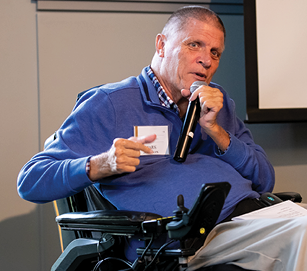
Laws works for UGA, which is a University Center for Excellence in Developmental Disabilities (UCEDD) and directs its inclusive post-secondary education program, Destination Dawgs. She teaches the Disability Studies Certificate program at the undergraduate and graduate levels and instructs multiple service-learning courses that focus on disability issues across the lifespan.
Heumann’s guest lecture to her class shared perspectives that continue to inform the work Laws is doing in the field of education.
Students heard about Heumann’s own struggles with isolation and inclusion, as well as the concrete examples of how those with disabilities are impacted. They learned about her continuing battle to have disability included in civil rights and legislation and were encouraged to keep the conversation going.
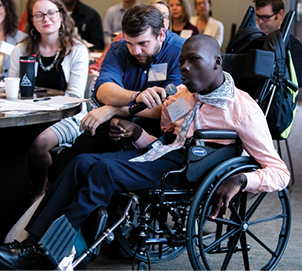 “To be honest, I think we were all a bit star struck,” said Laws. “We had watched documentaries about Judy’s rise to the top of the field as an advocate and policymaker. She spoke about her journey to becoming an advocate for people with disabilities; her work in national government; the importance of full inclusion in education and of belonging; and of the need for increased representation of people with disabilities in the media.”
“To be honest, I think we were all a bit star struck,” said Laws. “We had watched documentaries about Judy’s rise to the top of the field as an advocate and policymaker. She spoke about her journey to becoming an advocate for people with disabilities; her work in national government; the importance of full inclusion in education and of belonging; and of the need for increased representation of people with disabilities in the media.”
But she also focused on her career path that took her from Brooklyn, NY to California to DC to motivate the young advocates on what they can look forward to. “In some ways, I give you an overview of the work that I’ve done, particularly for younger people, as you never know what your life is going to give you.”
Heumann was also buoyed by her meetings with students. “It was clear they were eager to learn more about disabilities and their professors have them thinking about issues around disability and diversity.”
During her event in Decatur, she also pressed the audience to determine how they are working with their state and federal legislators to fund certain areas of importance.
“I think one of the most important parts of all of our work is we need to be living our lives and the work that we’re doing with the premise that everything is urgent, that we live one life, and depending on when you acquire your disabilities, there are many different issues that one has to deal with,” she said.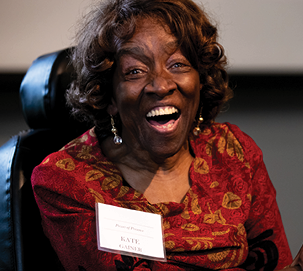
Also the symposium’s keynote speaker, Heumann reminded participants of the event’s goal: to document the history of the disability community. UGA’s Richard B. Russell Library for Political Research and Studies houses special collections from Georgia’s history in that arena.
“The symposium is a way to let people know about the collections and to get them to make donations to it,” said Gillian Grable, the community outreach coordinator at UGA’s Institute on Human Development and Disability. “It not only highlights parts of Georgia history; it also gets people thinking about actions they can take in their own communities. Judy did a historical review of inclusion over the decades and spoke about her own activist efforts to create inclusive practices.”
An organizer of San Francisco’s 504 sit-ins, Heumann reflected that they “brought together people with all types of disabilities, different ages, including families who had children with disabilities, who were working on getting a set of regulations for Section 504, which is a part of the Rehabilitation Act of 1973.”
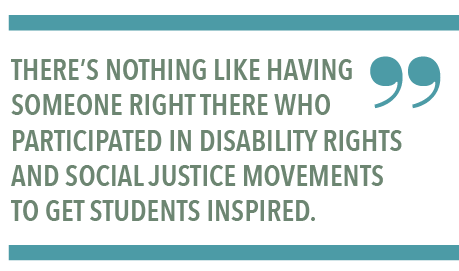 But, her most important contribution to the event was bringing that history to life, said Grable.
But, her most important contribution to the event was bringing that history to life, said Grable.
For Heumann, the visit provided insight into the work that still needs to be done around disability rights in Georgia.
“Through good discussions, I heard that people want more action, and they’re actively engaged in getting the problems more effectively understood and finding solutions,” she said. “I found that people are frustrated by how the legislature is still not doing what it needs to advance the rights of people with disabilities in the state, but I was glad to learn that advocacy groups are working hard in that area.”

